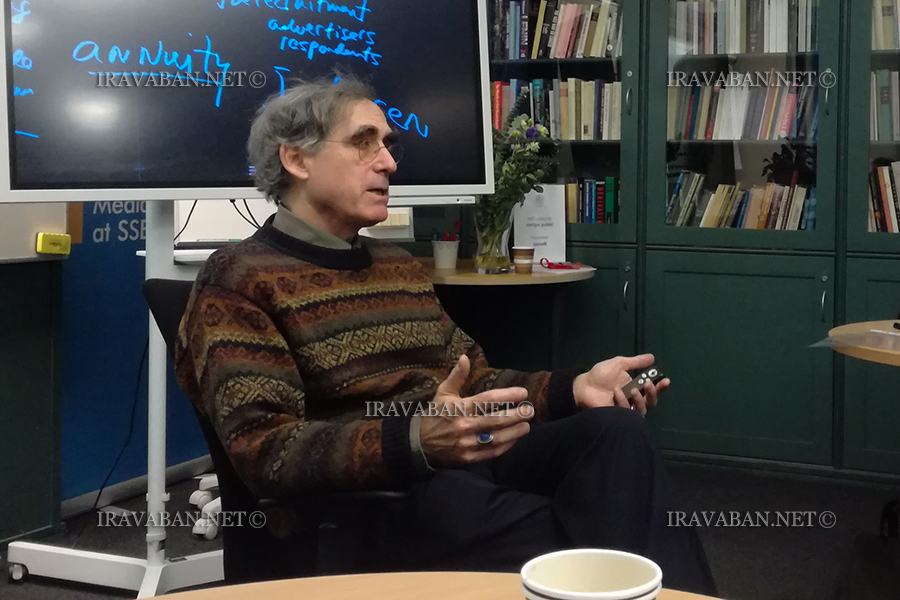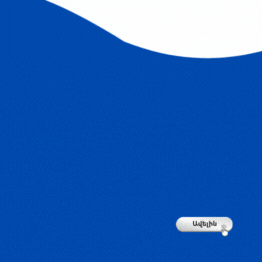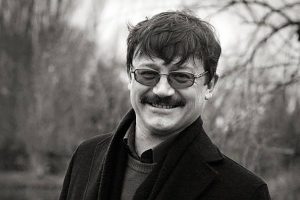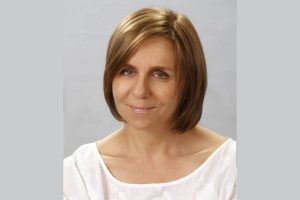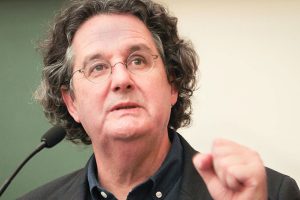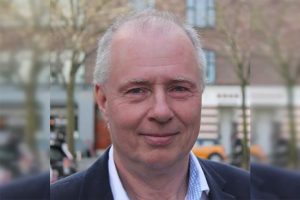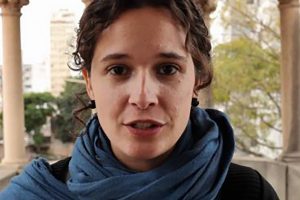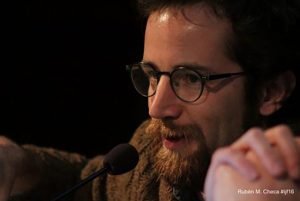Mark Lee Hunter is one of the most prominent figures in the field of investigative journalism of the world. Hunter has written well over 100 investigative stories and nine books, which earned him awards.
He is a founding member of The Global Investigative Journalism Network (GIJN) and an adjunct professor and senior research fellow at the INSEAD Social Innovation Centre in Fontainebleau, France. He has lived in France since 1982.
For Iravaban.net, Mark Lee Hunter talked about his key investigations and methods of investigative reporting.
-When I got acquainted with your background, I understood that you are one of the most prominent persons in the field of investigative journalism.
-But not for my reports. I had a career as an investigative reporter before the GIJN began in 2001. At the moment, I had taken a sabbatical from investigative reporting, which I’d been doing for more than 20 years. I went to work in a business school and my focus changed at the business school. I did a major investigative report in 2002, for which I won a prize I’d always wanted. Then I took a break from investigative reporting for a good dozen years to concentrate on investigative methods, because I perceived that at our GIJN conferences (about investigative reporting – author) we were attracting a lot of young people who had never done an investigation, and they could not grasp what the more experienced people in the network were talking about.
I was a prize winning reporter and I had done some heavy projects. So we would be talking about such projects at conferences, but in talking with people afterwards I realized that the level we were talking at left out a lot that these young people did not know about. The projects depended on a skill and experience base, that wasn’t available to these young people. And they didn’t know how to start. And the problem for them was getting started.
I was working in a business school and the people I was working with were experts in operations, manufacturing and all kinds of things. And I thought, how do we bring those insights to bear on what investigative reporters do? So I started thinking about that.
I gave a first presentation on the work I was doing at the Global Investigative Journalism Conference in Amsterdam in 2005. As soon as I gave the presentation I realized that something had changed. The previous generation of investigative reporters were coming up to me and saying: “I hear you said something amazing today.” The representatives of Arab Reporters for Investigative Journalism (ARIJ) were in the audience and they came up to me and said: “We want you write a manual of investigative journalism.” The first piece was thinking about a hypothesis rather than thinking about subjects. So you would start from a hypothesis. The next pieces fell into place progressively partly because of that speech in Amsterdam. A couple of people in the room came up to me and said: “We have another piece of your method.” And I thought, my method?! And I didn’t know it was a method yet (smiling). But I started thinking about how to put these things together into a single coherent process. That was how the Story-Based Inquiry book got written.
Also in the Amsterdam conference in 2005 the keynote speech was by David Leigh of The Guardian. David is a great, great journalist and editor. And his speech was about our employers cutting budgets, cutting people and money, downgrading what we do. And I said: “David, when you publish an investigation on the front page of The Guardian, do you sell more newspapers?” And he said: “I don’t know.” And I thought, why don’t we know this? If we are making the argument that what we do is valuable, why can’t we demonstrate the value?! And that is when I started to think about the business aspects of investigative journalism.
-But is it possible to do business in the field of investigative journalism and at the same time not break the rules of ethics?
-Sure. The crucial questions are: Who does your work matter to, who needs your work and why do they need it, how much do they need it? If you can answer those questions, you can, in fact, devise a business model that delivers that value, too. There is nothing magic about it. This is what good business journalism does. Good business journalism delivers very value-added information to economic actors. By the way, one of the astonishing things about business journalism is that it was never considered a field for investigating reporting. In the 1970’s and 1980’s the business desks were some of the last units in newspapers to adopt investigative reporting. Investigation was about politics or pollution or about the courts, but it was not about business. And, you know, with hindsight, it seems blindingly obvious that this was a big field for investigative reporting, but it was not at the time. Now it is very, very much.
-Do you think that now journalists have more chances to find fresh and scandalous information than before?
-First, investigation is not always about scandals. I mean in the sense that somebody has done a wrongdoing. A lot of what’s wrong in the world is just a mistake. Somebody made a mistake and nobody followed up on it. People in positions of responsibility are not supposed to make terrible mistakes but they do. And, honestly, I don’t hold that against them in the sense that I think they are bad people. I make mistakes, too. It doesn’t mean you’re a bad person, but the mistake has to be fixed. That is the job of the reporter, if nobody else is doing it. You have to find a mistake and say this is how we can fix it. It doesn’t mean somebody is a criminal.
-But sometimes it is criminal.
-Sometimes it is criminal. And in that case the work becomes much harder, much more dangerous, and much more difficult.
…I think the conditions are better now to do the work for several reasons. One is that investigative work changed from trying to get people who knew secrets to reveal them to finding open sources that would show you 90% of what happened and then getting the other 10%. 90% of any story is already in the public domain. This is how intelligence agencies work. I can confirm that, that is not an opinion because I have had the opportunity to talk with people in intelligence agencies. That is how they work and that is how the great investigative reporters work as well. They gather public information, they know what they are looking for (the main problem is to know what you are looking for, once you know it, you can find information). You know, there is more information to find now than there ever was. There is always some door to much of the information you need and then the rest is confirmation, or the rest is confronting someone with the 90% and making it easy for them to tell you about the other 10%.
90% of any story is already in the public domain.
-My next question is about how to earn money in investigative journalism as an individual and as an organization.
-As an individual, most people I know have a portfolio of activities. Non-stop investigative work can be exhausting, it is very high-tension work, it involves large investments of time and it involves a lot of anxiety, because people can get angry at you. You can make a lot of great friends, too, people of a very high quality, but you know that you will get some people angry at you.
So, as I say, most of the investigators I know have a portfolio of activities: They teach, they may do research at think-tanks or in universities, they may work with NGOs, there are any number of potential clients for someone who knows how to find things out, this is not a common skill. So that is one answer; if you know how to investigate, you will always have a job. It may not be a job working for a newspaper, but it will certainly permit you to undertake projects from a position of relative independence. Most of the work I have done on investigative journalism during the last 15 years, at the same time I had a part-time job in a business school, where I was doing investigative case studies, that would be taught in business schools and I was teaching those case studies. So this was a very important income stream that enabled me to continue working on and with investigations.
If you know how to investigate, you will always have a job.
As an organization, the key thing about making it pay is not simply doing the projects, it is promoting them, it is getting them to the people who need them. And we don’t spend anywhere near as much time investigating our audiences and the outlets for our work and the value of our work, as we do doing the work. We are entirely focused on the stories, and this is a mistake. Of course, the story is the basic substance, but if you look at the way Hollywood promotes and markets films and derives endless revenue streams from a single product, you realize how backward we are. We think it is enough to tell the story and the story will find its audience. That is very rarely true.
And we don’t spend anywhere near as much time investigating our audiences and the outlets for our work and the value of our work, as we do doing the work. We are entirely focused on the stories, and this is a mistake. Of course, the story is the basic substance, but if you look at the way Hollywood promotes and markets films and derives endless revenue streams from a single product, you realize how backward we are.
-What do you think about taking money from a business owner and doing an investigation on his business competitor?
-No! You cannot take money to do someone’s dirty work. If the person gives you the information, it is your business what you’re going to do with it, but you cannot be in the pay of a competitor nor can you be in the pay of a government official.
You know, one of the stories I worked on in France, was the contaminated blood story: A French government agency sold blood products that were contaminated with the AIDS virus (HIV) to hemophiliacs. It was government wrongdoing. I was not the person who revealed that story but I did a good investigation on it that helped out the principal author, who was a great friend of mine. So I am very glad that I did that work. And one of the people involved in that story was the medical editor at Le Monde. When the scandal broke he tried to destroy the coverage, he fought against Anne-Marie Casteret, who was the person who revealed that story at great personal risk. He fought her, he denounced her and then it turned out that he had been a salaried employee of the man who Anne-Marie was accusing, the guy who was running this government agency. That was appalling. He should never have been covering that story. He should never have continued his work on that story.
He had a conflict of interests.
To get back to your original question, if you are being paid to investigate someone and you are not being paid by the public, you have a conflict of interests. I mean, you can certainly do that job, but not as a journalist.
If you are being paid to investigate someone and you are not being paid by the public, you have a conflict of interests.
-Once you told about another investigation you had done, the story about the Louvre, “Portrait of a Killing,” which put your career at risk. How did it happen?
-Yes, the reason my career was at risk was because the story took a long time, and if I wasn’t able to get the documentation, if I couldn’t prove what I understood was true, I would have lost 4 years out of my career. The risk was that I could not deliver the story. And if I could not deliver it, I was finished as a writer. So that entails other risks. The first risk is I cannot prove it, the second risk is if I cannot prove it, I may be tempted to do something that is stupid, for example, making up the parts of the story I don’t know or making accusations that I cannot defend. Those were the risks. But the way it actually worked out was that I did realize what had happened; I did understand it and I was able to document it, I was able to prove the case. It turned into a much more successful exercise than I could have hoped. The book was never a bestseller but it did establish my reputation.
-It took 4 years…
-Yes. I started work on it at the beginning of 1990 and the book was published at the beginning of 1995. I was teaching at the time as well, so I had a source of income and I did some other work at that time as well. But basically the focus in my career at that time was that book.
-Mark, when did you start working in the field of investigative journalism and why did you choose this field?
-Because I left the university in 1975. It was still the Watergate era. I wanted to be a writer. And I wanted to make a living from writing. And people like Seymour Hersh (American investigative journalist and political writer – author) were God. What they were doing was just so unimaginable, so important and so exciting. And I wanted to be like them.
At the time, there was basically no instruction in investigative journalism: Everybody was figuring it out for themselves. It took me a long time to develop basic competencies. I had tremendous energy and I was interested in doing a lot of different things. So I managed to make my way. But being able to get deep into people’s lives, which is very much what the work is about, and to change the outcomes of stories was incredibly exciting and still is.
To me, investigation is about changing the outcome, it is not just about telling the story, you want to change the outcome in some ways. You cannot always, but sometimes you can. And the least you can do is comfort the victims.
To me, investigation is about changing the outcome, it is not just about telling the story, you want to change the outcome in some ways. You cannot always, but sometimes you can.
-And this motivated you to continue your work – the investigations. Once you spoke about colleagues, who stopped their career of an investigative reporter because of fear.
-I had to drop a story because I was scared. I was right to be scared. It was a story in which there were a lot of dead people. I realized that I could become one of them, that I was being targeted. So I dropped the story. I brought it to a bigger news organization and they went nowhere with it, but I realized that it was a situation I could not handle myself.
-So do you have methods or advice for young journalists on how to overcome fear and hard situations?
-The first thing is: They should avoid the temptation to talk about their work with other people unless they are people they truly trust. They should not talk about their work with actors in the story and with other journalists who don’t do investigations. Seymour Hersh talks about this a great bit in his memoirs. I was astonished; I thought this was only my problem, but when you talk to journalists who had never done investigations, they become jealous or they think you’re crazy.
The second thing is: You have to be very organized about the way you collect your material and organize the material, so that you can ask tough questions of yourself about whether you really know what you’re talking about. …because most of the fear is about getting it wrong. If you get the story wrong, you will not get a lot of defense, so you have to be sure that you are getting the story right.
The third thing is that if you are working in places where your physical safety could be compromised, you have to adopt secure procedures.
The fourth thing is that when we are dealing with people who are particularly dangerous they will tell you what their limits are. There was a reporter in Ireland, who was murdered by the Irish gangs. What she did that crossed the line was go to their houses, knock on the doors and talk to their wives. She knew that this was risky. Ok, she is a reporter: A reporter has the right or the power to go and talk to anyone anytime, but sometimes, you don’t do that, you don’t bring it to their doorsteps, you don’t get involved in their family. Everyone has lines. And you learn what the lines are. When I worked on the Extreme Right in France, my targets told me: “Say what you want about me, but don’t caricature me.” I thought that was a fair request, and I did not cross that line. I never had a problem after the book was published, even though the leaders of the National Front despised me. One of the truly dangerous people I met doing that project told me later, “There’s no hatred in your book.” That was a real compliment.
-Do you think that a journalist is more protected after publishing the story than before doing it – during the process of investigation?
-Yes, if you are in an insecure, unsafe position, you should publish as soon as you can. You don’t wait to get the thing perfect. You publish what you can prove now; you start to establish a position.
-But how can you publish it if you have not proven the main thing your investigation is about?
-That is rarely the problem. The problem is not “can I prove it?”, the problem is “What can I prove?” You go with what you can prove and you stay within those limits. You don’t step beyond it, and then you see what comes to you from that. When people see that you’re exploring a story, they will bring you more information. More sources will open to you. But if you wait to get everything, you can be in a very risky situation.
Sometimes you do have to get everything first. That was the situation I found myself in France, when I did this book on the crime that involved the Louvre. I had to get everything. It took me 2 and a half full years to get the proof, and then a year and half to write it, because it was a very complex story and it took me a while to figure out how to do it.
This business is not usually about perfection, it is about being able to prove what you say.
-By the way, only the first part of this book (“Portrait of a Killing”) is available in English, the rest is in French only, isn’t it?
-The full book was never published in English; I am going to do it myself this year. I published the first part in English just to see if anybody would find it interesting. And, in fact, I got feedback from people saying, “Where is the rest?” So I am going to clean it up and publish it, because it is my best book and I want it to be available in English.
-There are many investigative journalists who don’t have a family and children. What do you think, is it because of their risky work?
-No, though I did have one wonderful girlfriend who told me my work scared her, and that contributed to ending the relationship. If someone stays single, they may not be particularly gifted for relationships, or willing to invest in them. Seymour Hersh has a long and happy marriage. Andrew Jennings has a great marriage. I have heard well-meaning but wrongheaded journalism professors tell their students, especially women, that if they do this work they will never have a family. That is horseshit. If you want to have a family, you start one. Investigative journalists are extremely attractive people, they have personal traits that make them wonderful partners. They are very brave, they work hard, they are capable of paying close attention to stuff, and more than a few are very funny and charming. Some people may choose not to have a family but it has nothing to do with whether or not they have the option. Of course, they do.
Investigative journalists are extremely attractive people, they have personal traits that make them wonderful partners. They are very brave, they work hard, they are capable of paying close attention to stuff, and more than a few are very funny and charming.
-However, don’t you feel more vulnerable when you have children or a close one?
-I guess. I don’t have children and that is not because I am an investigative reporter, except indirectly. I always valued my independence above everything else. Having children gives you responsibilities and obligations, but nothing stops you from marrying someone who has a different kind of career, who can guarantee certain other aspects of life. It is a matter of how you choose your partner, and not a matter of whether or not you can have a partner. I see men who are interested in the women who are at investigative journalism conferences. These women are extraordinary. If I were 30 years younger and not married, I would be glad to have one of them for a partner.
I don’t think that people who do things they really care with a lot of energy, desire and ambition, would be unattractive to anyone else. It is just not true.
When I started I had a girlfriend who really liked what I did; it was one of the reasons that I did the work. And if I had had a family or children at that time, maybe I would have done something else. But maybe not. I love this work, and that’s one reason I never stopped doing it. And my wife told me one day: “You are not a mediocrity.” That’s a big reason I do it, too.
Interview by Astghik Karapetyan

